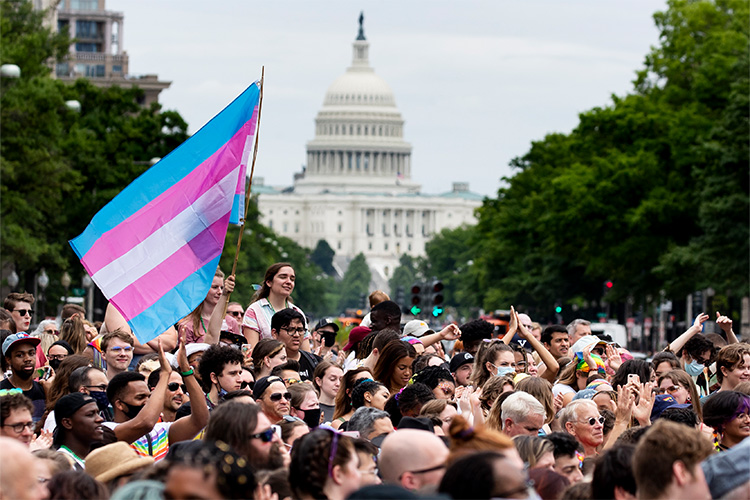
Hundreds rally for pride month to show support for LGBTQ community at the Capitol in Washington DC. photo by Micheal Reynolds
2023 has already set a record for the amount of anti-LGBTQ legislation introduced, heavily impacting transgender communities across the country.
Often, when people picture Lesbian, Gay, Bisexual, Trans, and Queer rights, the first thing that comes to mind is marriage laws. In 2015, the Supreme Court ruled that state-wide bans on gay marriage were unconstitutional, and from then on, it became officially legal in all fifty states to be able to marry someone of the same sex. However, there are still several issues that LGBTQ people experience in America. A significant portion of queer communities are still pushing for equal rights, and in 2023, those who identify as transgender or lie outside of the gender binary are struggling to exist in America.
Transgender is a term used to describe individuals that do not align with the gender they were assigned at birth. It’s considered an umbrella term that also houses those who identify as non-binary and genderqueer. In reality, the number of Americans who identify as trans is truly very low. In July 2021, the U.S. Census Bureau Household Pulse Survey collected information on gender identity in America. They discovered that around 1.03% of the population identifies as transgender, which is about 2.6 million Americans. To put that into perspective, the current population of the U.S. lies at a little more than 334 million people.
Congress has managed to set a record for the amount of anti-trans legislation being introduced and enacted, even before the half-year mark. News reports from as early as April declared that nearly four hundred bills that would affect LGBTQ citizens were brought to the table, and as of September, that number has jumped to 567, according to the Trans Legislation Tracker. The tracker is a public website that can be found at https://translegislation.com/. While 125 of the bills have failed, 83 have been officially passed, and 359 of them are currently active.
A majority of the bills target trans youth, and many LGBTQ individuals point out that the legislation will disproportionately affect trans women and trans people of color. Examples of legislation appearing include bills that would allow schools, doctors, and other institutions to out trans youth to their parents and/or guardians, or bills that would erase mentions of LGBTQ discussions in education. These are only a minuscule amount of legislative proposals. Other issues surrounding restrooms, sports, and especially medical care and treatment remain heavily prevalent in the many bills.
Many that promote the passing of anti-trans legislation argue that the bills aim to protect children against what they describe as “indoctrination.” However, LGBTQ individuals and groups that advocate for queer rights stress that the legislation will do more to harm youth than it will to protect them. A study conducted by four researchers that was published in the National Library of Medicine discovered that as of 2022, nearly 82% of transgender youth have seriously contemplated ending their own lives, and 40% have attempted suicide. Professionals and researchers stress that the rate of suicide will only continue to increase in conjunction with every piece of anti-trans legislation passed.
As of September, it’s unknown as to what the future will hold for trans rights, and while 2023 remains to be a stressful year for trans communities, there are many resources out there for individuals who find themselves in need of help. The Trevor Project features a helpline and other resources built for queer youth, and One Colorado is a local organization dedicated to advocating for LGBTQ rights.